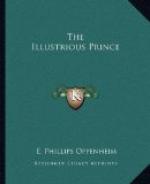“Nothing particular,” the Inspector answered carelessly. “Well, Mr. Coulson, I won’t take up any more of your time. I am convinced that you have told me all that you know, and I am afraid that I shall have to look elsewhere to find the loose end of this little tangle.”
“Stay and have another drink,” Mr. Coulson begged. “I’ve nothing to do. There are one or two boys coming in later who’ll like to meet you.”
The Inspector shook his head.
“I must be off,” he said. “I want to get into my office before six o’clock. I dare say I shall be running across you again before you go back.”
He shook hands and turned away. Then Mr. Coulson made what was, perhaps, his second slight mistake.
“Say, Mr. Jacks,” he exclaimed, “what made you mention that young lady’s name, anyway? I’m curious to know.”
The Inspector looked thoughtfully at the end of the fresh cigar which he had just lit.
“Well,” he said, “I don’t know that there was anything definite in my mind, only it seems a little strange that you and Miss Penelope Morse should both have been acquainted with the murdered man and that you should have come across one another.”
“Sort of bond between us, eh?” Mr. Coulson replied. “She seemed a very charming young lady. Cut above Fynes, I should think.”
The detective smiled.
“All your American young ladies who come over here are charming,” he said. “Goodbye, Mr. Coulson, and many thanks!”
The Inspector passed out, and the man whom he had come to visit, after a moment’s hesitation, resumed his seat.
“These aren’t American methods,” he muttered to himself. “I don’t understand them. That man Jacks is either a simpleton or he is too cunning for me.”
He crossed to a writing table and scribbled an unnecessary note, addressing it to a firm in the city. Then he rang for a messenger boy and handed it to him for delivery. A few minutes afterwards he strolled out into the hall. The boy was in the act of handing the note to one of the head porters, who carefully copied the address. Mr. Coulson returned to the smoking room, whistling softly to himself.
CHAPTER XI. A COMMISSION
Mr. Robert Blaine-Harvey, American Ambassador and Plenipotentiary Extraordinary to England, was a man of great culture, surprising personal gifts, and with a diplomatic instinct which amounted almost to genius. And yet there were times when he was puzzled. For at least half an hour he had been sitting in his great library, looking across the Park, and trying to make up his mind on a very important matter. It seemed to him that he was face to face with what amounted almost to a crisis in his career. His two years at the Court of St. James had been pleasant and uneventful enough. The small questions which had presented themselves for adjustment between the two countries were, after all, of no particular importance




